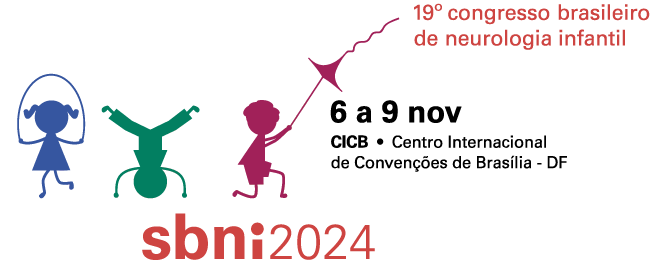Dados do Trabalho
Título
USE OF FINGOLIMOD IN MANAGING PEDIATRIC MULTIPLE SCLEROSIS LEADING TO EPILEPSY: AN OVERLOOKED SIDE EFFECT IN CHILDREN
Apresentação do caso único
In January 2021, a 10-year-old female with a history of ataxia and impaired balance, but without cognitive alteration or decreased consciousness, without significant family history. On admission, MRI revealed significant signal alterations in the infratentorial and supratentorial white matter, suggesting multiple sclerosis. She received pulse therapy for 5 days with partial symptom improvement. Initial treatment with interferon was started but was modified to fingolimod in September 2021 following a relapse. In February 2022, at the age of 11, she experienced her first seizure, a subsequent MRI showed no new demyelinating lesions. In March, she had additional seizures and was started on epilepsy treatment.
Discussão
Pediatric-onset multiple sclerosis (MS) is rare, 2-10% of MS patients first experience symptoms during childhood or adolescence, with 98% presenting a relapsing-remitting course. Pediatric patients face higher relapse rates and a longer time to secondary progression compared to adults, but cognitive impairment occurs in up to 50% within five years of onset. Early initiation of disease-modifying drugs (DMDs) is crucial to minimize disability and preserve function.
Fingolimod has historically proven effective in reducing relapse rates and lesion enlargement in MS patients. However, the adverse effects observed in the pediatric population cannot be ignored. The PARADIGMS study supports fingolimod's use as a first-line therapy due to its significant efficacy, but it also underscores the importance of recognizing and addressing the unique side effect profile in children. The higher frequency of seizures in pediatric patients using fingolimod highlights the necessity for continuous monitoring and further research to develop safer therapeutic options for managing pediatric MS.
The FREEDOMS trial, which focused on adults with an average age of 38 and included 429 patients on fingolimod, reported just 2 cases of seizures at high doses. In contrast, the PARADIGMS trial, which included 107 pediatric patients aged 10-17, found that 6 out of 107 patients on fingolimod experienced seizures. These findings suggest that while fingolimod is relatively safe for adults, its use in children requires caution due to a higher incidence of central nervous system side effects such as seizures
Comentários finais
This case reinforces the need for ongoing evaluation and the development of alternative DMDs that offer a safer profile for the pediatric population.
Referências
COHEN, J. A. et al. Oral fingolimod or intramuscular interferon for relapsing multiple sclerosis. The New England journal of medicine, v. 362, n. 5, p. 402–15, 2010.
CHITNIS, T. et al. Trial of Fingolimod versus Interferon Beta-1a in Pediatric Multiple Sclerosis. New England Journal of Medicine, v. 379, n. 11, p. 1017–1027, 13 set. 2018.
Onset of clinical and MRI efficacy occurs early after fingolimod treatment initiation in relapsing multiple sclerosis. Disponível em:
Calabresi, P. A., Radue, E.-W., Goodin, D., Jeffery, D., Rammohan, K. W., Reder, A. T., … Lublin, F. D. (2014). Safety and efficacy of fingolimod in patients with relapsing-remitting multiple sclerosis (FREEDOMS II): a double-blind, randomised, placebo-controlled, phase 3 trial. The Lancet Neurology, 13(6), 545–556. doi:10.1016/s1474-4422(14)70049-3
Sorensen, P. S. (2014). Effects of fingolimod in relapsing-remitting multiple sclerosis. The Lancet Neurology, 13(6), 526–527. doi:10.1016/s1474-4422(14)70067-5
Palavras Chave
fingolimod; Pediatric multiple sclerosis; seizures
Área
Neuroimunologia, esclerose múltipla e outras doenças desmielinizantes
Autores
YASMIM MENDES SILVA , PAULO BREINIS, RAFAEL GUERRA CINTRA , RAQUEL MONICO CAVEDO , LAURA MARIA VISCARDI BRIGHENTI, MARCELLA GONCALVES FERREIRA, HUGO RAPHAEL RESENDE CRUZ , FERNANDA SÁ BOHN ASSIS, NATALIA JOSIELE CERQUEIRA CHECON
